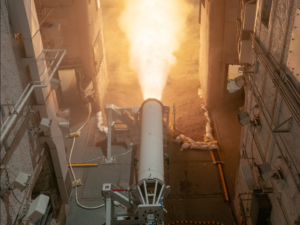
The Navy’s Strategic Systems Programs (SSP) Office has successfully tested the First Stage Rocket Motor (SRM) that will be used for the force’s Conventional Prompt Strike (CPS) offensive hypersonic strike capability, and the Army’s Long Range Hypersonic Weapon (LRHW). The test took place in Promontory, Utah on May 27th. Read Lockheed Martin’s full press release on the test below.
The Lockheed Martin (NYSE: LMT) and Northrop Grumman (NYSE: NOC) team successfully conducted a significant live fire hypersonic strike system test in support of the U.S. Navy’s Conventional Prompt Strike (CPS) and U.S. Army’s Long Range Hypersonic Weapon (LRHW) programs.
In this live fire ground test of the first stage solid rocket motor, the motor fired for the full trial duration and met performance parameters and objectives within anticipated ranges.
“We’re pleased to celebrate this important event with the U.S. Navy, Army and Northrup Grumman. This outcome today is due to our shared effort and determination to see this test on the Conventional Prompt Strike program succeed,” said Steve Layne, Program Director of Conventional Strike Programs at Lockheed Martin. “This live fire event is a major milestone on the path to providing hypersonic strike capability to the U.S. Navy and U.S. Army warfighters.”
Northrop Grumman developed the motor and Lockheed Martin serves as the prime weapon systems integrator to provide boost capability to the U.S. Navy and U.S. Army hypersonic strike missile.
“Northrop Grumman is proud to leverage our expertise in flight-proven solid rocket propulsion to support the nation’s efforts to develop an advanced end-to-end missile system capable of deterring emerging and future threats,” said Charlie Precourt, vice president, propulsion systems, Northrop Grumman.
CPS is a hypersonic boost glide missile and weapon system that enables long range flight with high survivability against enemy defenses. CPS and LRHW share a common all up round that can be launched from surface ships, submarines, and land-based mobile launchers. The U.S. Department of Defense has made developing hypersonic strike systems a top mission priority and Lockheed Martin’s investment in hypersonic innovation dates back more than 30 years.



